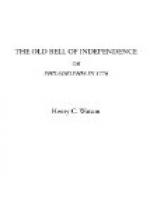“There appeared to be no difference of opinion about the mode of disposing of the prisoners—indeed, an opinion was scarcely asked or given. It seemed taken for granted—a thing of course; and the culprits were led in silence to the selected place of execution. There was neither judge nor jury—no delay—no prayer for mercy; a large oak then stood at the forks of two roads, one of which leads to Freehold; from the body of the tree a horizontal branch extended over the latter road, to which two ropes were attached. One of them having been fixed to the minor villain’s neck, his sufferings were soon over; but a horrible and lingering death was reserved for Fagan. The iron hoops were taken off a meat cask, and by a blacksmith in the company fitted round his ankles, knees, and arms, pinioning the latter to his body, so that, excepting his head, which was ‘left free to enjoy the prospect,’ he could not move a muscle. In this condition he hung for days beside his stiffened companion; dying by inches of famine and cold, which had moderated so as, without ending, to aggravate his misery. Before he died, he had gnawed his shoulder from very hunger. On the fifth night, as it approached twelve o’clock, having been motionless for hours, his guards believed him to be dead, and, tired of their horrid duty, proposed to return home. In order, however, to be sure, they sent one of the party up the ladder to feel if his heart still beat. He had ascended into the tree, when a shriek, unlike anything human, broke upon the stillness of the night, and echoed from the neighboring wood with redoubled power. The poor fellow dropped from the tree like a dead man, and his companions fled in terror from the spot. When day encouraged them to return, their victim was swinging stiffly in the north wind—now lifeless as the companion of his crime and its punishment. It is believed, to this day, that no mortal power, operating upon the lungs of the dead murderer, produced that awful, unearthly, and startling scream; but that it was the voice of the Evil One, warning the intrusive guard not to disturb the fiend in the possession of his lawful victim; a belief materially strengthened by a fact that could not be disputed—the limb upon which the robbers hung, after suffering double pollution from them and their master’s touch, never budded again; it died from that hour; the poison gradually communicated to the remaining branches, till, from a flourishing tree, it became a sapless and blasted trunk, and so stood for years, at once an emblem and a monument of the murderers’ fate.




